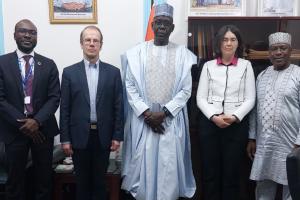Today, following the example of several countries in the region, Niger officially confirmed its desire to accede to the United Nations Convention on the Protection and Use of Transboundary Watercourses and International Lakes, more commonly known as the Water Convention. This upcoming accession is a decisive step for the region as it will bring Lake Chad fully under the Convention's legal framework. By becoming a Party, Niger will join the riparian countries of Lake Chad, namely Chad and Cameroon, which became Parties in 2020 and 2022 respectively, and Nigeria, which is in the process of becoming a Party.
Niger shares 90% of its water resources with its neighboring countries. The rapid increase in water demand due to population growth (Niger has 25 million inhabitants and an annual population growth rate of nearly 4%), urbanization, intensification of irrigated agriculture and increasing industrialization are posing increasing challenges to the country's shared water resources. The exacerbation of these challenges has recently led to greater reliance on groundwater resources. In addition, the sustainability of these resources is also threatened by the effects of climate change.
In such a context, transboundary cooperation represents a necessary tool to address some of these challenges, by providing a space for discussion between riparian countries to identify joint solutions. In this regard, Niger has already signed several agreements on its shared resources such as the Lake Chad Basin Water Charter. In addition, Niger is also a member of the Niger Basin Authority and the Lake Chad Basin Commission, key basin organizations in the region.
Joining the Water Convention will allow Niger to consolidate this existing cooperation with its neighbouring countries, notably by facilitating the implementation of these regional legal frameworks. The Minister of Water and Sanitation, Mr. Adamou Mahaman, indicated today at the national workshop that "the Water Convention constitutes a legal framework whose implementation, in addition to regional frameworks and national instruments, will certainly contribute to supporting our country's efforts in transboundary cooperation on our shared basins, conflict prevention, peace promotion and sub-regional integration.
What does this mean for the Sahel region?
The Sahel's climatic vulnerability is reflected in episodes of severe drought and variable rainfall, making the region at times subject to heavy rains and flooding and at other times to insufficient rainfall. Water scarcity, in particular, threatens the livelihoods of millions of people who depend on rain-fed agriculture and livestock. In recent decades, competition for land, water, and food has intensified in the region, leading to increased instability, particularly around Lake Chad and in the Niger River basin.
The accession of more and more countries in the region to the Water Convention will help to politically prioritize the issue of water resources management through enhanced cooperation at the political and technical levels - also taking into account the inherent interactions that exist between access to water, food security and regional instability.
The Convention also provides a solid basis to help mobilize financing and reduce the risks of investment in water infrastructure.
Sonja Koeppel, Secretary of the Convention, said, "Niger's upcoming accession to the Water Convention confirms the growing political interest worldwide in transboundary cooperation on shared water resources. The United Nations Water Conference to be held from 22-24 March 2023 will provide an opportunity to advance this issue, particularly in the context of the interactive dialogue on water for cooperation. This is important given that more than 60% of water resources are found in transboundary basins.”
The national workshop, which brought together more than 80 participants, was organized with the financial support of the European Union through the project "Promoting Accession to the Water Convention" which aims to support the accession and implementation of the Water Convention and thus strengthen transboundary cooperation on water and the sustainable and peaceful management of shared water resources.


